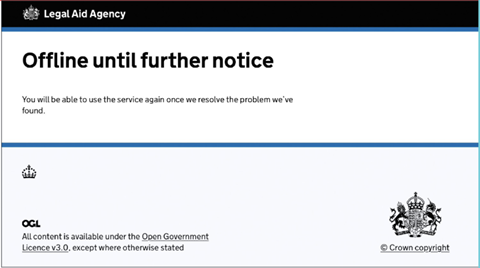Sarah Sackman lent a sympathetic ear to legal aid lawyers attending a parliamentary meeting last week. But the minister still couldn’t say when the Legal Aid Agency portal will be fixed

Legal aid lawyers are rarely granted an audience with a government minister. So last week’s All-Party Parliamentary Group on Access to Justice was worth a trip to Westminster, for practitioners and journalists both. Justice minister Sarah Sackman, whose remit includes legal aid, listened intently as lawyers recounted the toll that the Legal Aid Agency cyber-attack, court backlogs and poor pay are taking on their sector.
In May, almost a month after the cyber-attack was discovered, the LAA took down its online portal, which is used by practitioners for applications and to get paid. Jenny Beck, director of family law specialist Beck Fitzgerald, told Sackman the fallout could be the ‘final straw’ for lawyers still waiting for ‘critical investment’ in family legal aid.
The government wants to halve violence against women and girls, but Beck said that legal aid fees for family work are too low to sustain a supplier base willing to undertake the necessary work. Remuneration for securing a non-molestation order works out at around £30 per hour, when the fixed fee is divided by the hours of work involved.
With the LAA portal down, Beck’s staff are relying on telephone and paper for applications and case progression – work that will need to be uploaded once the LAA’s system is restored. Staff are doing at least two hours’ extra work per case for which the firm will be unable to claim payment. The LAA’s costs assessment guidance treats claims for downtime or the system’s sluggishness as office overheads, which means the costs are not recoverable.
‘For a firm supporting 15 women fleeing domestic abuse in a single week, this equates to 30 additional hours of unrecoverable work. That time cannot be absorbed, meaning fewer vulnerable clients assisted,’ Beck said.
Sackman told the meeting she was ‘cognisant’ of the impact of the data breach and would pass on the feedback. Acknowledging that the LAA’s IT systems were not user-friendly, she insisted lessons would be learned from the latest crisis.
Community Law Partnership’s Craig Keenan highlighted capacity issues. His firm receives up to 10 new enquiries a day, but ‘there’s no way we can get through them’. The firm needs to close files to open new ones, ‘because our fee-earners are working flat out’. Last Friday, at 3.50pm, the firm received an enquiry – 15 residents living in temporary accommodation were told at short notice they had to leave next week. CLP and the other housing providers in Birmingham were already operating at full capacity.
'We are in a moment we cannot afford to miss. If the government, MoJ, all actors in the system do not grip [the crisis], the system will be irrecoverable'
Sarah Sackman KC, justice minister
Housing lawyers are ‘swamped’, Keenan said. Moreover, civil court delays often mean lengthy waits for sealed orders and default costs certificates.
Ian Townley, director of billing and costs at Liverpool firm Broudie Jackson Canter, explained that advice deserts and low ‘matter start’ figures do not fully capture the reality of unmet legal need. His firm kept a record of the number of cases it could not accept between June 2024 and May 2025. The firm received, on average, 73 enquiries a month across various civil legal aid categories that it was unable to take on.
Moving to the criminal jurisdiction, Garden Court Chambers’ Joanne Cecil KC shared examples highlighting ‘the absurdity of sitting days and what it means for judges and case listings’. In one case, counsel was present for the trial but the judge could not hear the case because a sitting day was unavailable. A murder trial was interrupted so that another judge could use the courtroom to hear a short matter.
Jury trials could be curbed if the government accepts Sir Brian Leveson’s criminal courts review recommendations. But Cecil said members of the public believe in the right to a jury trial. Cecil could not think of a case where juries have reached the wrong result – but noted the same cannot always be said for judicial decisions.
On the criminal courts backlog, Sackman said people point to empty courtrooms, but it was important to distinguish between judicial and system capacity. For instance, are there enough ushers or prison staff to service additional sitting days? As for jury trials, Sackman said it was fair to consider the question posed by Leveson.
‘We are in a moment we cannot afford to miss,’ Sackman added. ‘If the government, MoJ, all actors in the system do not grip [the crisis], the system will be irrecoverable.’
The system was close to irrecoverable before the cyber-attack wreaked havoc.
This article is now closed for comment.




































6 Readers' comments